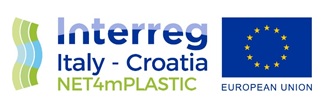
New Technologies for Macro and Microplastic Detection and Analysis in the Adriatic Basin - NET4mPLASTIC
Summary and general objective
There are very limited data on micro-waste and microplastics in the Adriatic Sea, lacking standard operating protocols for sampling, detection and quantification of microplastics, as well as reliable data on microplastic concentrations and the composition of polymers in the marine environment. Consequently, there is a need to improve and develop methods to reduce time and effort in identifying and detecting micro plastics.
Project approach is based on cooperation between Italian and Croatian research organizations, small and medium-sized enterprises and local authorities in Italy and Croatia in addressing the common challenge of plastics and microplastics in the Adriatic Sea. The project aims to develop common solutions for monitoring plastic distribution, defining their impacts on human health and implementing an integrated platform associated with Early Warning Systems. The project will use existing systems (transport model and EWS) and innovative technologies (drons, integrated platform) that will be explored and developed to achieve the main project objectives.
New Technologies for Macro and Microplastic Detection and Analysis in the Adriatic Basin - NET4mPLASTIC is one of the latest Interreg projects in which the Faculty participates as a partner. The main objective of the project is to collect data on the distribution and composition of microplastics along Croatian and Italian coastal and marine areas. The project is aimed at improving the quality of water in the sea by applying a common integrated approach identifying microplastic accumulation zones and controls for the implementation of any mitigation measures.
Specific objectives
- Improve cooperation in the context of exchange of knowledge on marine waste and changing of traditional approaches,
- Improve the awareness of the population through the development of Early Warning System with the GIS database and
- Detect microbial contamination in marine bios and related pollutants as potential risks to human health.
Main activities
- Implementation of new technological solutions for monitoring mircoplastics in marine and coastal areas;
- Development of an open access common platform coupled with and Early Warning System;
- Designing an on-board unit for field activities and installed on marine drones for activities along the coast and on ships for offshore activities;
- Approach standardization summarized in guidelines and recommendations for fishing and blue economy related to microplastics management and limitations at improving water quality;
- Realization of 8 field surveys (water, sediment and shellfish) with 160 samples of sediments, 32 stream/river samplings and 64 samplings of microplastics on the sea surface (manta);
- Testing new methodologies for recycling plastic items and in particular the development of an EP patent.
Expected results
The project will enhance the knowledge and understanding of the impacts associated with macro and microplastics in the coastal and marine environment by gathering different experts. The final result will be to evaluate the state of science, determine the distribution, the abundance and influence of microplastic deposition, and raise public awareness through online and offline dissemination Expected results are:
- Analysis of the state of the art: ecological, climatological and geomorphological state of the research area;
- Characterization of issues related to beach and waste management in the research areas;
- Microplastic source characterization;
- Collection of microplastic samples from marine environment, coastal areas and shellfish;
- Improved quality of the sea and coastal areas through innovative technologies and approaches;
- Defining the best practices for managing, monitoring and evaluating microplastics;
- The development of a sensory platform set up on ships or marine drons;
- Forecasting potential scenarios of microplastic accumulation areas (mapping);
- Establish an Early Warning System and a common GIS database for microplastic accumulation areas that are forecasted after events such as river storms and so on;
- Bridging the gap in lack of information with regard to microplastics, marine ecosystem and human health: the correlation of reported data, marine analytical testing and in vitro risk assessment for human health.
The project involves five partners from Italy: the Department of Physics and Earth Sciences of the University of Ferrara (main partner), the Faculty of Civil Engineering and Architecture of the University of Trieste, the Marche Region, the Veterinary Institute of Public Health Abruzzo and Molise Region and Hydra Solutions SRL and four partners from Croatia: Institute of Public Health PGŽ, Public Institution RERA SD for co-ordination and development of the Split-Dalmatia County, Faculty of Civil Engineering, Architecture and Geodesy of the University of Split and Prosoft d.o.o. from Rijeka.
The project is funded under the 2014 - 2020 Interreg V-A, Italy-Croatia CBC Program. The project value is 2,478,640.00 EUR, of which 85% is funded from the European Regional Development Fund. The estimated duration of the project is the end of June 2021.